Company Law: An Analysis of Fiduciary Duties in Corporate Governance
VerifiedAdded on 2023/06/07
|9
|2717
|150
Report
AI Summary
This report provides a comprehensive analysis of fiduciary duties within the context of company law, focusing on the obligations of directors and partners. It examines the nature of these duties, differentiating between express and implied obligations, and explores the legal frameworks governing these responsibilities, particularly within the Australian context. The report delves into the implications of fiduciary duties, including the duty of loyalty, the avoidance of conflicts of interest, and the requirement to act in good faith. It also addresses the roles of promoters, directors, and shareholders, and how they owe fiduciary duties to each other and the company. Furthermore, the report discusses the application of fiduciary duties in partnership businesses, covering the partners' obligations to each other and the consequences of breaches. The importance of good faith, fair dealing, and full disclosure is emphasized throughout the analysis. Finally, the report references relevant case law and statutory provisions, including the Corporations Act 2001 (Cth) and the Partnership Act 1963, to provide a detailed understanding of fiduciary duties in corporate governance.
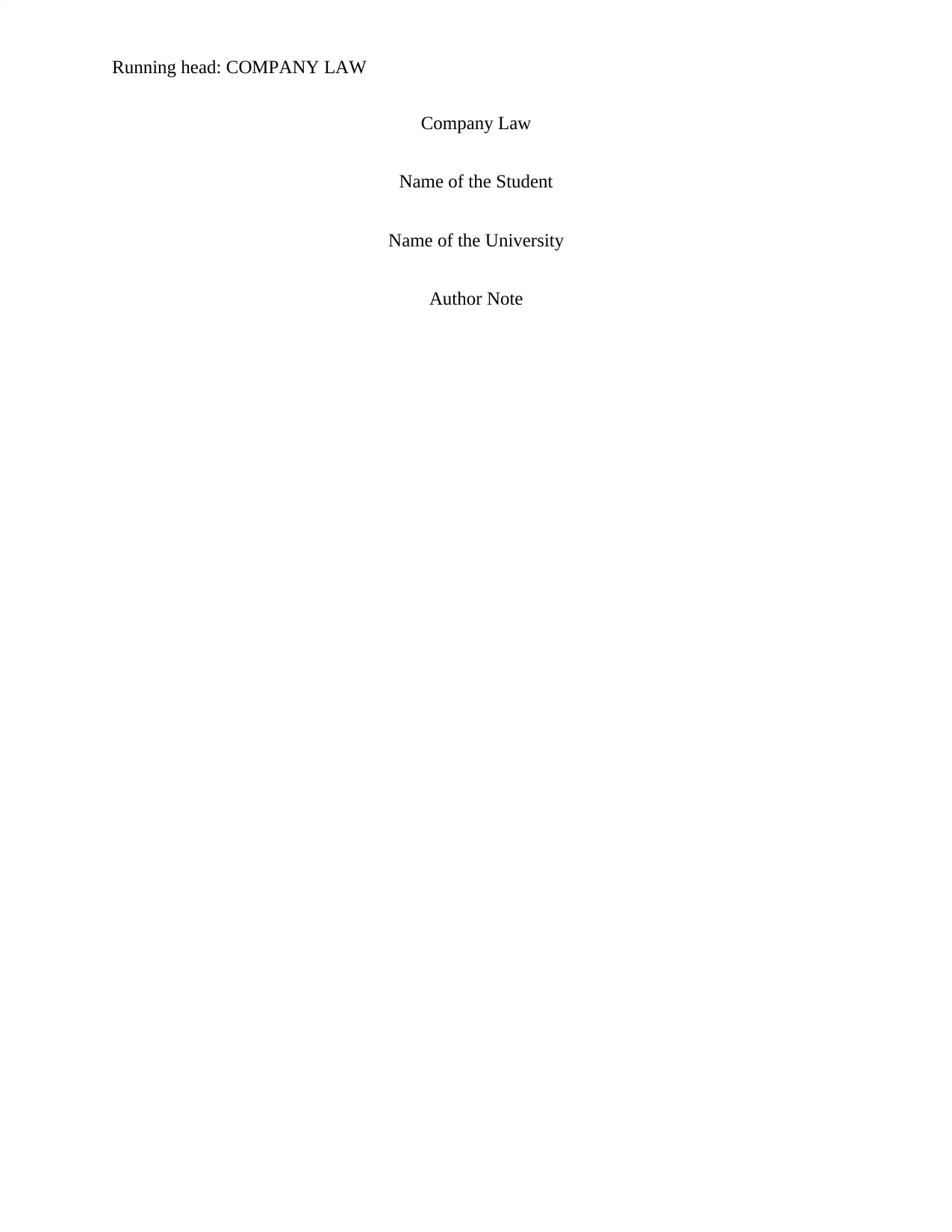
Running head: COMPANY LAW
Company Law
Name of the Student
Name of the University
Author Note
Company Law
Name of the Student
Name of the University
Author Note
Paraphrase This Document
Need a fresh take? Get an instant paraphrase of this document with our AI Paraphraser
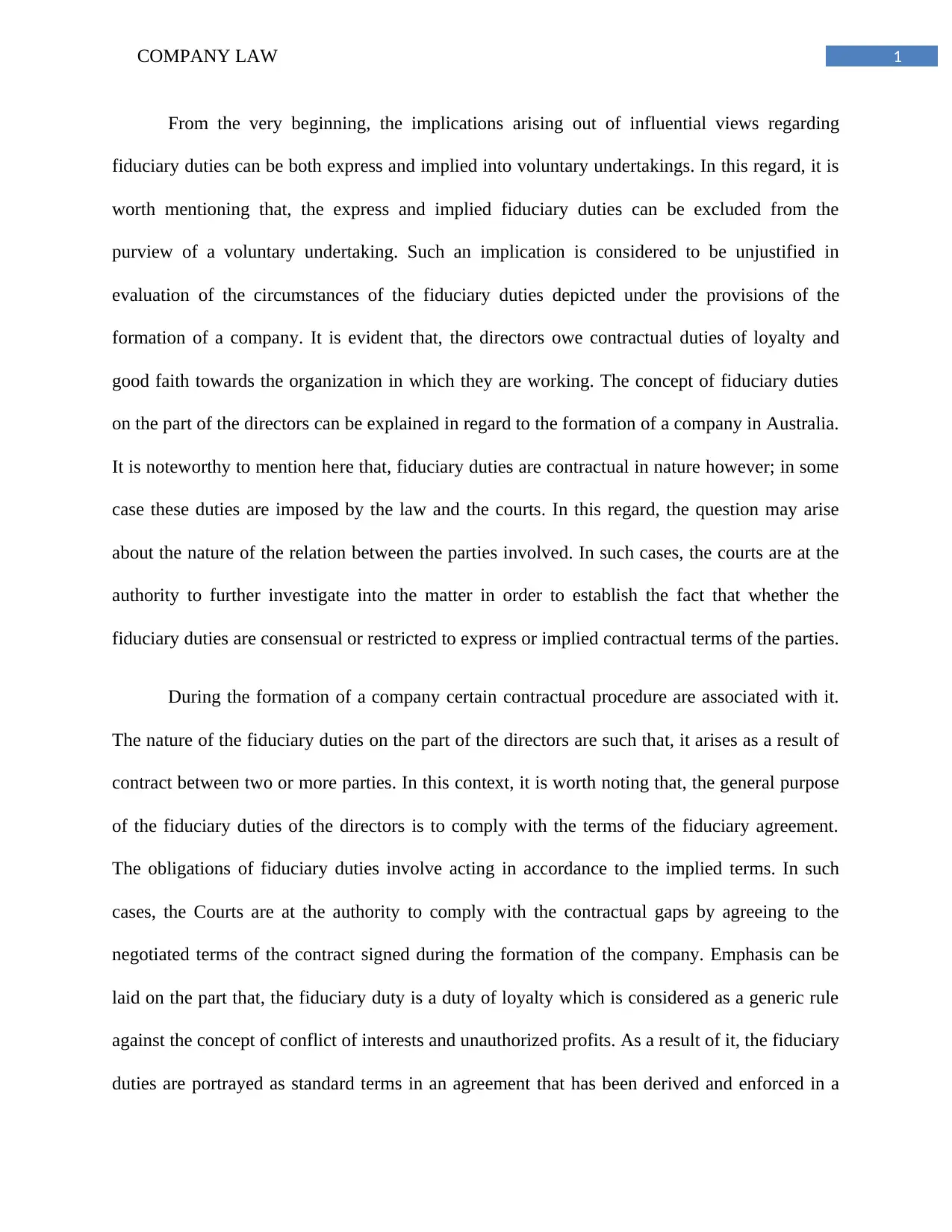
1COMPANY LAW
From the very beginning, the implications arising out of influential views regarding
fiduciary duties can be both express and implied into voluntary undertakings. In this regard, it is
worth mentioning that, the express and implied fiduciary duties can be excluded from the
purview of a voluntary undertaking. Such an implication is considered to be unjustified in
evaluation of the circumstances of the fiduciary duties depicted under the provisions of the
formation of a company. It is evident that, the directors owe contractual duties of loyalty and
good faith towards the organization in which they are working. The concept of fiduciary duties
on the part of the directors can be explained in regard to the formation of a company in Australia.
It is noteworthy to mention here that, fiduciary duties are contractual in nature however; in some
case these duties are imposed by the law and the courts. In this regard, the question may arise
about the nature of the relation between the parties involved. In such cases, the courts are at the
authority to further investigate into the matter in order to establish the fact that whether the
fiduciary duties are consensual or restricted to express or implied contractual terms of the parties.
During the formation of a company certain contractual procedure are associated with it.
The nature of the fiduciary duties on the part of the directors are such that, it arises as a result of
contract between two or more parties. In this context, it is worth noting that, the general purpose
of the fiduciary duties of the directors is to comply with the terms of the fiduciary agreement.
The obligations of fiduciary duties involve acting in accordance to the implied terms. In such
cases, the Courts are at the authority to comply with the contractual gaps by agreeing to the
negotiated terms of the contract signed during the formation of the company. Emphasis can be
laid on the part that, the fiduciary duty is a duty of loyalty which is considered as a generic rule
against the concept of conflict of interests and unauthorized profits. As a result of it, the fiduciary
duties are portrayed as standard terms in an agreement that has been derived and enforced in a
From the very beginning, the implications arising out of influential views regarding
fiduciary duties can be both express and implied into voluntary undertakings. In this regard, it is
worth mentioning that, the express and implied fiduciary duties can be excluded from the
purview of a voluntary undertaking. Such an implication is considered to be unjustified in
evaluation of the circumstances of the fiduciary duties depicted under the provisions of the
formation of a company. It is evident that, the directors owe contractual duties of loyalty and
good faith towards the organization in which they are working. The concept of fiduciary duties
on the part of the directors can be explained in regard to the formation of a company in Australia.
It is noteworthy to mention here that, fiduciary duties are contractual in nature however; in some
case these duties are imposed by the law and the courts. In this regard, the question may arise
about the nature of the relation between the parties involved. In such cases, the courts are at the
authority to further investigate into the matter in order to establish the fact that whether the
fiduciary duties are consensual or restricted to express or implied contractual terms of the parties.
During the formation of a company certain contractual procedure are associated with it.
The nature of the fiduciary duties on the part of the directors are such that, it arises as a result of
contract between two or more parties. In this context, it is worth noting that, the general purpose
of the fiduciary duties of the directors is to comply with the terms of the fiduciary agreement.
The obligations of fiduciary duties involve acting in accordance to the implied terms. In such
cases, the Courts are at the authority to comply with the contractual gaps by agreeing to the
negotiated terms of the contract signed during the formation of the company. Emphasis can be
laid on the part that, the fiduciary duty is a duty of loyalty which is considered as a generic rule
against the concept of conflict of interests and unauthorized profits. As a result of it, the fiduciary
duties are portrayed as standard terms in an agreement that has been derived and enforced in a
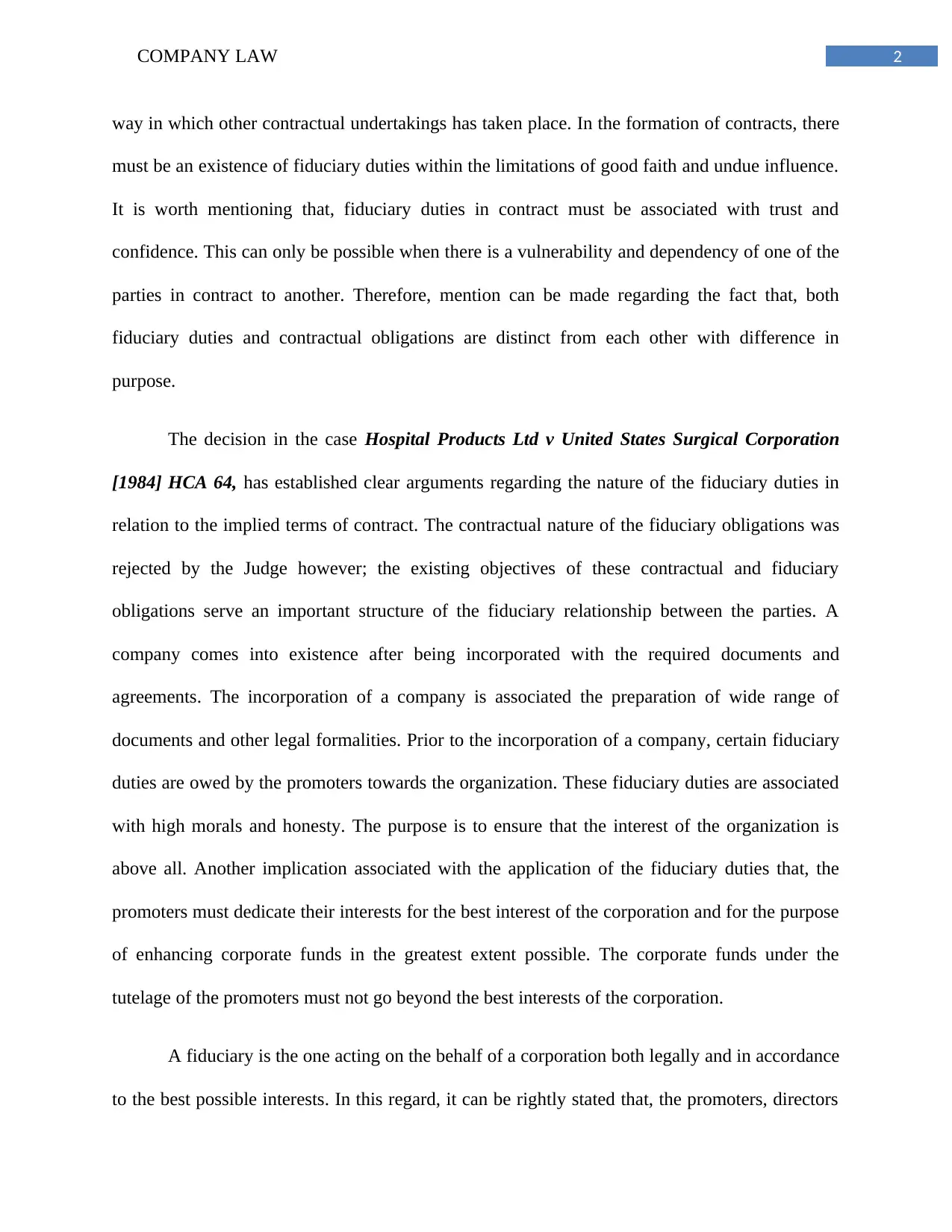
2COMPANY LAW
way in which other contractual undertakings has taken place. In the formation of contracts, there
must be an existence of fiduciary duties within the limitations of good faith and undue influence.
It is worth mentioning that, fiduciary duties in contract must be associated with trust and
confidence. This can only be possible when there is a vulnerability and dependency of one of the
parties in contract to another. Therefore, mention can be made regarding the fact that, both
fiduciary duties and contractual obligations are distinct from each other with difference in
purpose.
The decision in the case Hospital Products Ltd v United States Surgical Corporation
[1984] HCA 64, has established clear arguments regarding the nature of the fiduciary duties in
relation to the implied terms of contract. The contractual nature of the fiduciary obligations was
rejected by the Judge however; the existing objectives of these contractual and fiduciary
obligations serve an important structure of the fiduciary relationship between the parties. A
company comes into existence after being incorporated with the required documents and
agreements. The incorporation of a company is associated the preparation of wide range of
documents and other legal formalities. Prior to the incorporation of a company, certain fiduciary
duties are owed by the promoters towards the organization. These fiduciary duties are associated
with high morals and honesty. The purpose is to ensure that the interest of the organization is
above all. Another implication associated with the application of the fiduciary duties that, the
promoters must dedicate their interests for the best interest of the corporation and for the purpose
of enhancing corporate funds in the greatest extent possible. The corporate funds under the
tutelage of the promoters must not go beyond the best interests of the corporation.
A fiduciary is the one acting on the behalf of a corporation both legally and in accordance
to the best possible interests. In this regard, it can be rightly stated that, the promoters, directors
way in which other contractual undertakings has taken place. In the formation of contracts, there
must be an existence of fiduciary duties within the limitations of good faith and undue influence.
It is worth mentioning that, fiduciary duties in contract must be associated with trust and
confidence. This can only be possible when there is a vulnerability and dependency of one of the
parties in contract to another. Therefore, mention can be made regarding the fact that, both
fiduciary duties and contractual obligations are distinct from each other with difference in
purpose.
The decision in the case Hospital Products Ltd v United States Surgical Corporation
[1984] HCA 64, has established clear arguments regarding the nature of the fiduciary duties in
relation to the implied terms of contract. The contractual nature of the fiduciary obligations was
rejected by the Judge however; the existing objectives of these contractual and fiduciary
obligations serve an important structure of the fiduciary relationship between the parties. A
company comes into existence after being incorporated with the required documents and
agreements. The incorporation of a company is associated the preparation of wide range of
documents and other legal formalities. Prior to the incorporation of a company, certain fiduciary
duties are owed by the promoters towards the organization. These fiduciary duties are associated
with high morals and honesty. The purpose is to ensure that the interest of the organization is
above all. Another implication associated with the application of the fiduciary duties that, the
promoters must dedicate their interests for the best interest of the corporation and for the purpose
of enhancing corporate funds in the greatest extent possible. The corporate funds under the
tutelage of the promoters must not go beyond the best interests of the corporation.
A fiduciary is the one acting on the behalf of a corporation both legally and in accordance
to the best possible interests. In this regard, it can be rightly stated that, the promoters, directors
⊘ This is a preview!⊘
Do you want full access?
Subscribe today to unlock all pages.

Trusted by 1+ million students worldwide
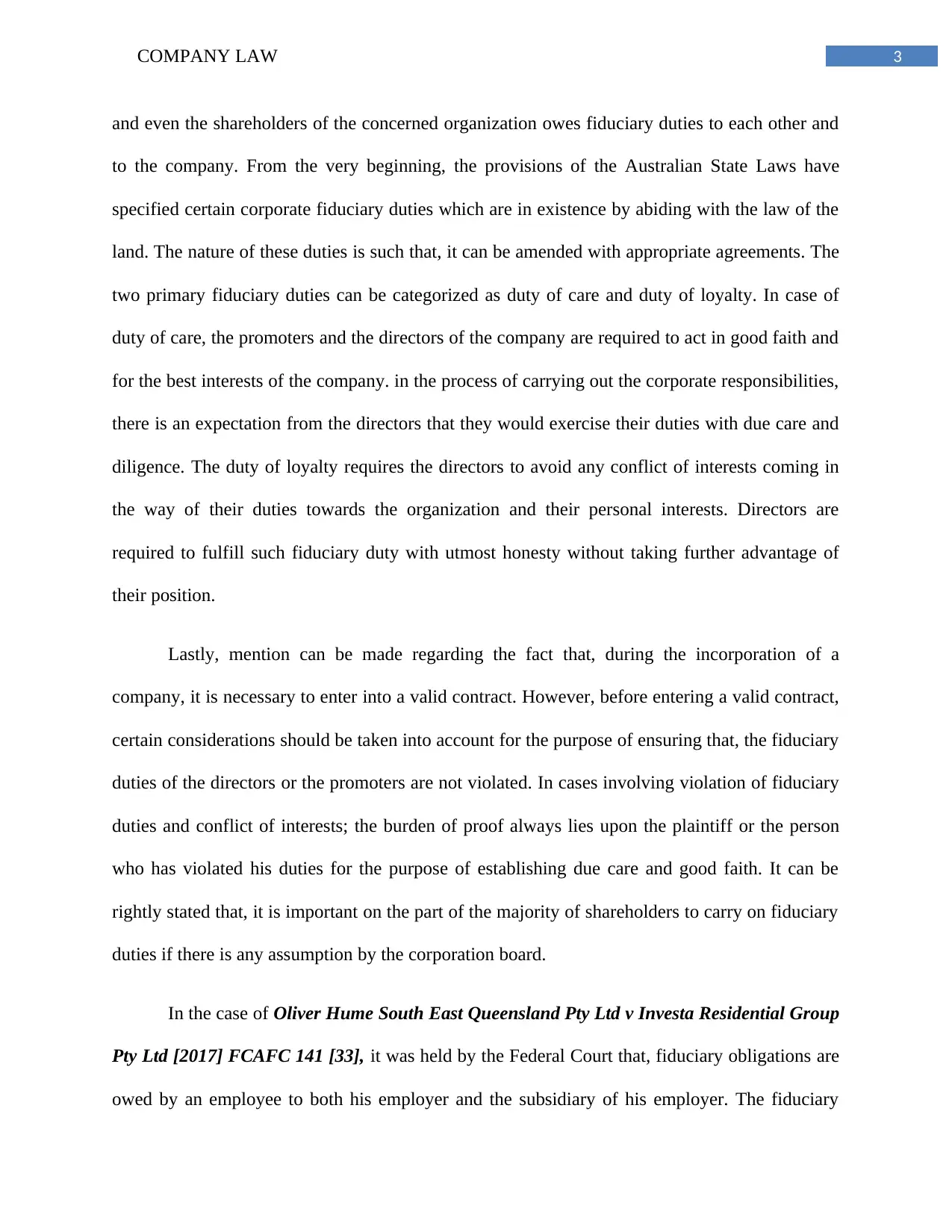
3COMPANY LAW
and even the shareholders of the concerned organization owes fiduciary duties to each other and
to the company. From the very beginning, the provisions of the Australian State Laws have
specified certain corporate fiduciary duties which are in existence by abiding with the law of the
land. The nature of these duties is such that, it can be amended with appropriate agreements. The
two primary fiduciary duties can be categorized as duty of care and duty of loyalty. In case of
duty of care, the promoters and the directors of the company are required to act in good faith and
for the best interests of the company. in the process of carrying out the corporate responsibilities,
there is an expectation from the directors that they would exercise their duties with due care and
diligence. The duty of loyalty requires the directors to avoid any conflict of interests coming in
the way of their duties towards the organization and their personal interests. Directors are
required to fulfill such fiduciary duty with utmost honesty without taking further advantage of
their position.
Lastly, mention can be made regarding the fact that, during the incorporation of a
company, it is necessary to enter into a valid contract. However, before entering a valid contract,
certain considerations should be taken into account for the purpose of ensuring that, the fiduciary
duties of the directors or the promoters are not violated. In cases involving violation of fiduciary
duties and conflict of interests; the burden of proof always lies upon the plaintiff or the person
who has violated his duties for the purpose of establishing due care and good faith. It can be
rightly stated that, it is important on the part of the majority of shareholders to carry on fiduciary
duties if there is any assumption by the corporation board.
In the case of Oliver Hume South East Queensland Pty Ltd v Investa Residential Group
Pty Ltd [2017] FCAFC 141 [33], it was held by the Federal Court that, fiduciary obligations are
owed by an employee to both his employer and the subsidiary of his employer. The fiduciary
and even the shareholders of the concerned organization owes fiduciary duties to each other and
to the company. From the very beginning, the provisions of the Australian State Laws have
specified certain corporate fiduciary duties which are in existence by abiding with the law of the
land. The nature of these duties is such that, it can be amended with appropriate agreements. The
two primary fiduciary duties can be categorized as duty of care and duty of loyalty. In case of
duty of care, the promoters and the directors of the company are required to act in good faith and
for the best interests of the company. in the process of carrying out the corporate responsibilities,
there is an expectation from the directors that they would exercise their duties with due care and
diligence. The duty of loyalty requires the directors to avoid any conflict of interests coming in
the way of their duties towards the organization and their personal interests. Directors are
required to fulfill such fiduciary duty with utmost honesty without taking further advantage of
their position.
Lastly, mention can be made regarding the fact that, during the incorporation of a
company, it is necessary to enter into a valid contract. However, before entering a valid contract,
certain considerations should be taken into account for the purpose of ensuring that, the fiduciary
duties of the directors or the promoters are not violated. In cases involving violation of fiduciary
duties and conflict of interests; the burden of proof always lies upon the plaintiff or the person
who has violated his duties for the purpose of establishing due care and good faith. It can be
rightly stated that, it is important on the part of the majority of shareholders to carry on fiduciary
duties if there is any assumption by the corporation board.
In the case of Oliver Hume South East Queensland Pty Ltd v Investa Residential Group
Pty Ltd [2017] FCAFC 141 [33], it was held by the Federal Court that, fiduciary obligations are
owed by an employee to both his employer and the subsidiary of his employer. The fiduciary
Paraphrase This Document
Need a fresh take? Get an instant paraphrase of this document with our AI Paraphraser
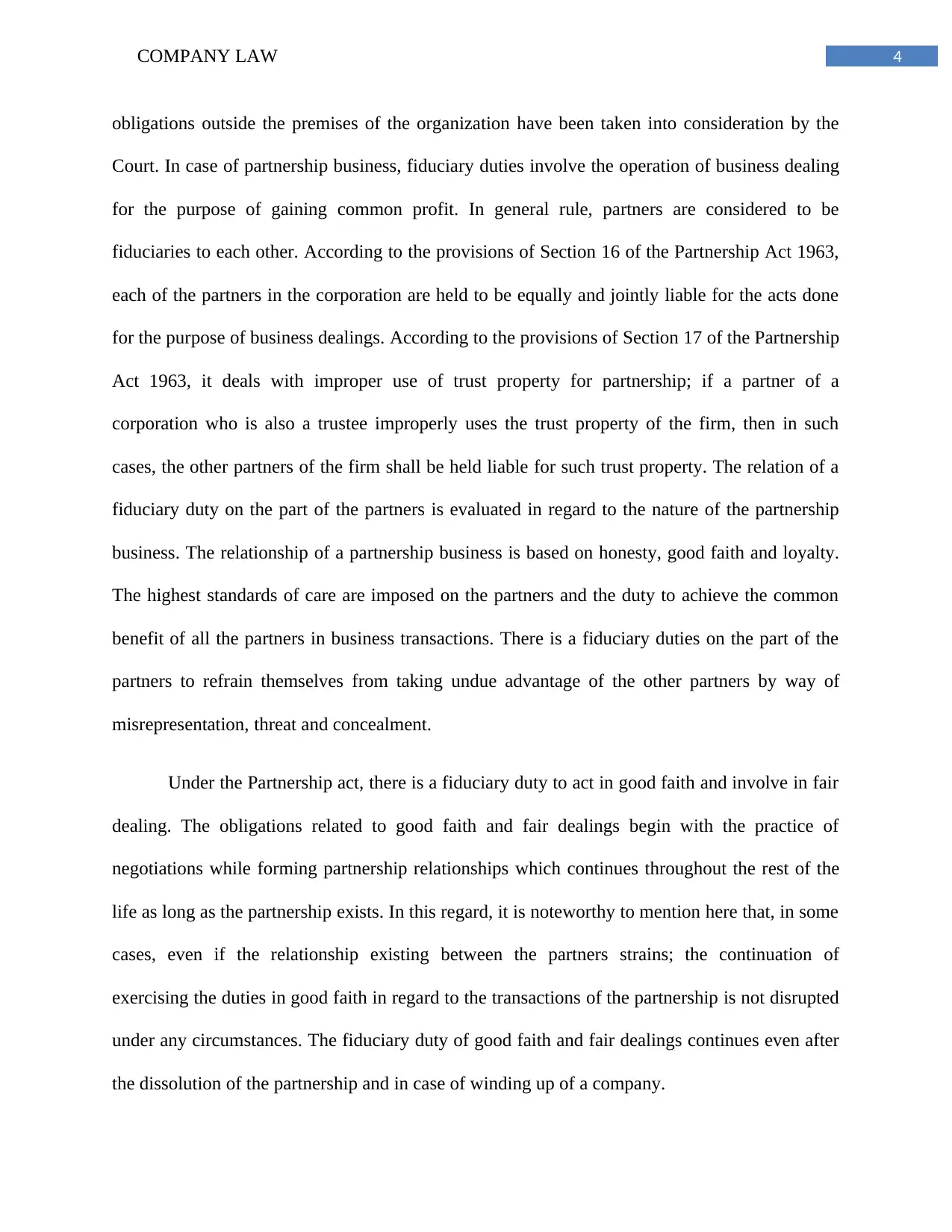
4COMPANY LAW
obligations outside the premises of the organization have been taken into consideration by the
Court. In case of partnership business, fiduciary duties involve the operation of business dealing
for the purpose of gaining common profit. In general rule, partners are considered to be
fiduciaries to each other. According to the provisions of Section 16 of the Partnership Act 1963,
each of the partners in the corporation are held to be equally and jointly liable for the acts done
for the purpose of business dealings. According to the provisions of Section 17 of the Partnership
Act 1963, it deals with improper use of trust property for partnership; if a partner of a
corporation who is also a trustee improperly uses the trust property of the firm, then in such
cases, the other partners of the firm shall be held liable for such trust property. The relation of a
fiduciary duty on the part of the partners is evaluated in regard to the nature of the partnership
business. The relationship of a partnership business is based on honesty, good faith and loyalty.
The highest standards of care are imposed on the partners and the duty to achieve the common
benefit of all the partners in business transactions. There is a fiduciary duties on the part of the
partners to refrain themselves from taking undue advantage of the other partners by way of
misrepresentation, threat and concealment.
Under the Partnership act, there is a fiduciary duty to act in good faith and involve in fair
dealing. The obligations related to good faith and fair dealings begin with the practice of
negotiations while forming partnership relationships which continues throughout the rest of the
life as long as the partnership exists. In this regard, it is noteworthy to mention here that, in some
cases, even if the relationship existing between the partners strains; the continuation of
exercising the duties in good faith in regard to the transactions of the partnership is not disrupted
under any circumstances. The fiduciary duty of good faith and fair dealings continues even after
the dissolution of the partnership and in case of winding up of a company.
obligations outside the premises of the organization have been taken into consideration by the
Court. In case of partnership business, fiduciary duties involve the operation of business dealing
for the purpose of gaining common profit. In general rule, partners are considered to be
fiduciaries to each other. According to the provisions of Section 16 of the Partnership Act 1963,
each of the partners in the corporation are held to be equally and jointly liable for the acts done
for the purpose of business dealings. According to the provisions of Section 17 of the Partnership
Act 1963, it deals with improper use of trust property for partnership; if a partner of a
corporation who is also a trustee improperly uses the trust property of the firm, then in such
cases, the other partners of the firm shall be held liable for such trust property. The relation of a
fiduciary duty on the part of the partners is evaluated in regard to the nature of the partnership
business. The relationship of a partnership business is based on honesty, good faith and loyalty.
The highest standards of care are imposed on the partners and the duty to achieve the common
benefit of all the partners in business transactions. There is a fiduciary duties on the part of the
partners to refrain themselves from taking undue advantage of the other partners by way of
misrepresentation, threat and concealment.
Under the Partnership act, there is a fiduciary duty to act in good faith and involve in fair
dealing. The obligations related to good faith and fair dealings begin with the practice of
negotiations while forming partnership relationships which continues throughout the rest of the
life as long as the partnership exists. In this regard, it is noteworthy to mention here that, in some
cases, even if the relationship existing between the partners strains; the continuation of
exercising the duties in good faith in regard to the transactions of the partnership is not disrupted
under any circumstances. The fiduciary duty of good faith and fair dealings continues even after
the dissolution of the partnership and in case of winding up of a company.
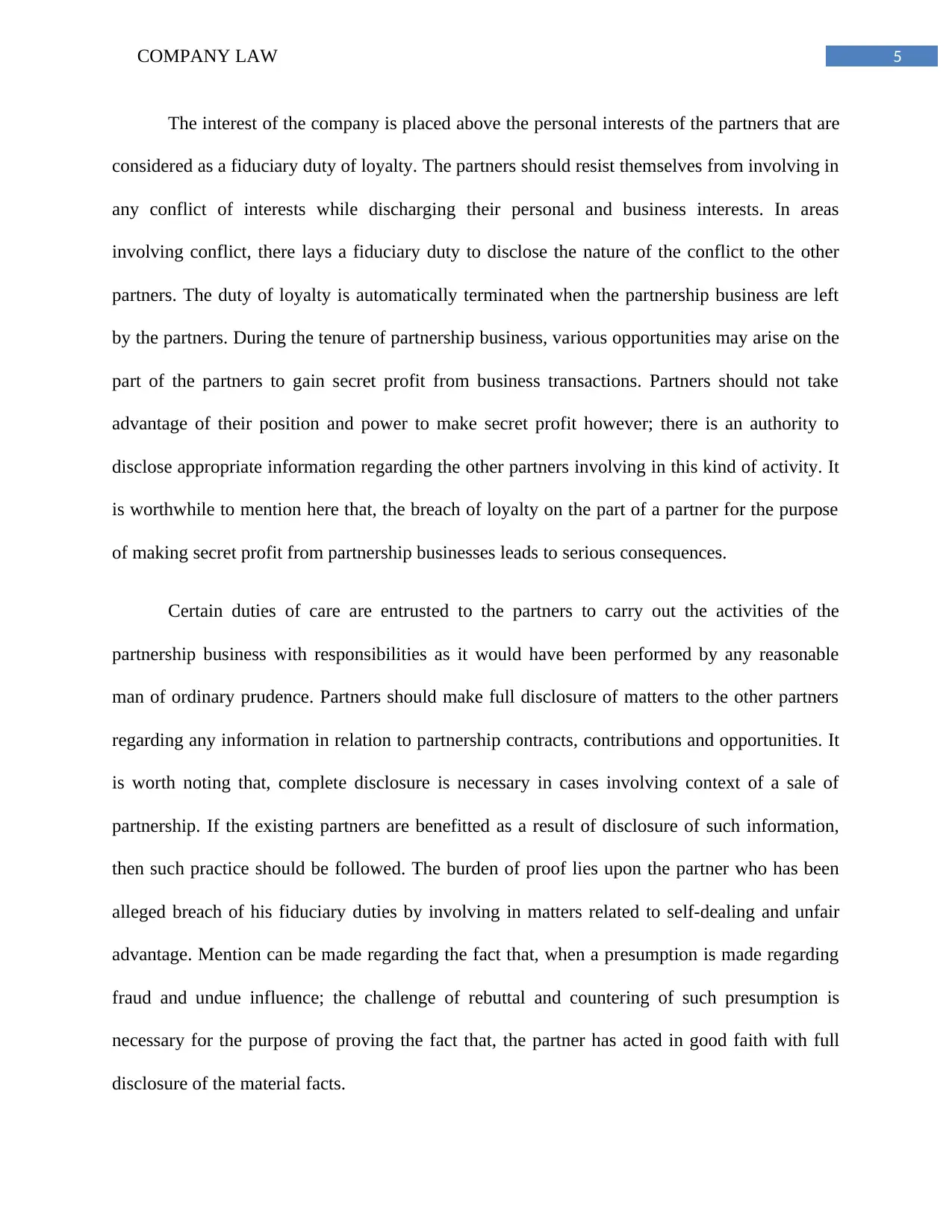
5COMPANY LAW
The interest of the company is placed above the personal interests of the partners that are
considered as a fiduciary duty of loyalty. The partners should resist themselves from involving in
any conflict of interests while discharging their personal and business interests. In areas
involving conflict, there lays a fiduciary duty to disclose the nature of the conflict to the other
partners. The duty of loyalty is automatically terminated when the partnership business are left
by the partners. During the tenure of partnership business, various opportunities may arise on the
part of the partners to gain secret profit from business transactions. Partners should not take
advantage of their position and power to make secret profit however; there is an authority to
disclose appropriate information regarding the other partners involving in this kind of activity. It
is worthwhile to mention here that, the breach of loyalty on the part of a partner for the purpose
of making secret profit from partnership businesses leads to serious consequences.
Certain duties of care are entrusted to the partners to carry out the activities of the
partnership business with responsibilities as it would have been performed by any reasonable
man of ordinary prudence. Partners should make full disclosure of matters to the other partners
regarding any information in relation to partnership contracts, contributions and opportunities. It
is worth noting that, complete disclosure is necessary in cases involving context of a sale of
partnership. If the existing partners are benefitted as a result of disclosure of such information,
then such practice should be followed. The burden of proof lies upon the partner who has been
alleged breach of his fiduciary duties by involving in matters related to self-dealing and unfair
advantage. Mention can be made regarding the fact that, when a presumption is made regarding
fraud and undue influence; the challenge of rebuttal and countering of such presumption is
necessary for the purpose of proving the fact that, the partner has acted in good faith with full
disclosure of the material facts.
The interest of the company is placed above the personal interests of the partners that are
considered as a fiduciary duty of loyalty. The partners should resist themselves from involving in
any conflict of interests while discharging their personal and business interests. In areas
involving conflict, there lays a fiduciary duty to disclose the nature of the conflict to the other
partners. The duty of loyalty is automatically terminated when the partnership business are left
by the partners. During the tenure of partnership business, various opportunities may arise on the
part of the partners to gain secret profit from business transactions. Partners should not take
advantage of their position and power to make secret profit however; there is an authority to
disclose appropriate information regarding the other partners involving in this kind of activity. It
is worthwhile to mention here that, the breach of loyalty on the part of a partner for the purpose
of making secret profit from partnership businesses leads to serious consequences.
Certain duties of care are entrusted to the partners to carry out the activities of the
partnership business with responsibilities as it would have been performed by any reasonable
man of ordinary prudence. Partners should make full disclosure of matters to the other partners
regarding any information in relation to partnership contracts, contributions and opportunities. It
is worth noting that, complete disclosure is necessary in cases involving context of a sale of
partnership. If the existing partners are benefitted as a result of disclosure of such information,
then such practice should be followed. The burden of proof lies upon the partner who has been
alleged breach of his fiduciary duties by involving in matters related to self-dealing and unfair
advantage. Mention can be made regarding the fact that, when a presumption is made regarding
fraud and undue influence; the challenge of rebuttal and countering of such presumption is
necessary for the purpose of proving the fact that, the partner has acted in good faith with full
disclosure of the material facts.
⊘ This is a preview!⊘
Do you want full access?
Subscribe today to unlock all pages.

Trusted by 1+ million students worldwide
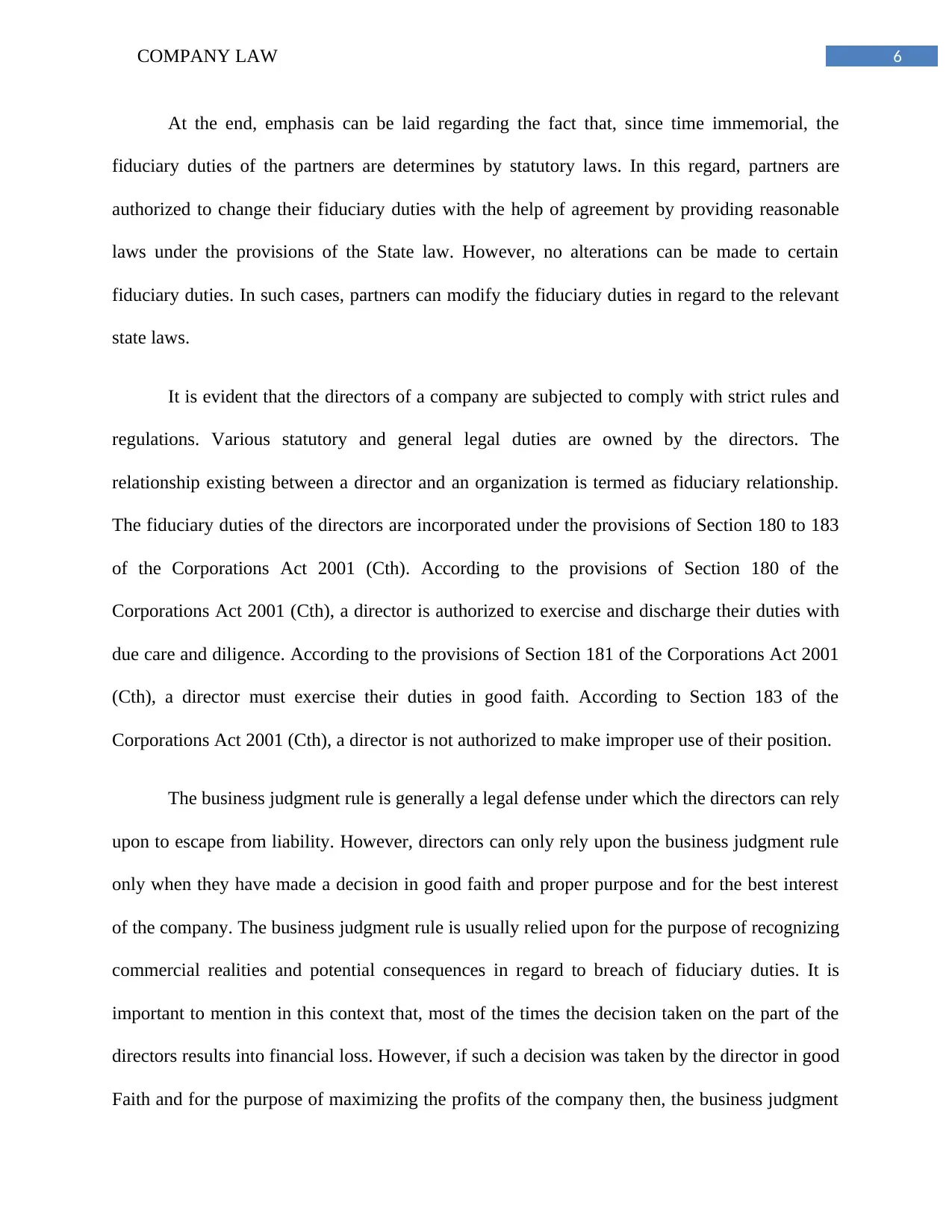
6COMPANY LAW
At the end, emphasis can be laid regarding the fact that, since time immemorial, the
fiduciary duties of the partners are determines by statutory laws. In this regard, partners are
authorized to change their fiduciary duties with the help of agreement by providing reasonable
laws under the provisions of the State law. However, no alterations can be made to certain
fiduciary duties. In such cases, partners can modify the fiduciary duties in regard to the relevant
state laws.
It is evident that the directors of a company are subjected to comply with strict rules and
regulations. Various statutory and general legal duties are owned by the directors. The
relationship existing between a director and an organization is termed as fiduciary relationship.
The fiduciary duties of the directors are incorporated under the provisions of Section 180 to 183
of the Corporations Act 2001 (Cth). According to the provisions of Section 180 of the
Corporations Act 2001 (Cth), a director is authorized to exercise and discharge their duties with
due care and diligence. According to the provisions of Section 181 of the Corporations Act 2001
(Cth), a director must exercise their duties in good faith. According to Section 183 of the
Corporations Act 2001 (Cth), a director is not authorized to make improper use of their position.
The business judgment rule is generally a legal defense under which the directors can rely
upon to escape from liability. However, directors can only rely upon the business judgment rule
only when they have made a decision in good faith and proper purpose and for the best interest
of the company. The business judgment rule is usually relied upon for the purpose of recognizing
commercial realities and potential consequences in regard to breach of fiduciary duties. It is
important to mention in this context that, most of the times the decision taken on the part of the
directors results into financial loss. However, if such a decision was taken by the director in good
Faith and for the purpose of maximizing the profits of the company then, the business judgment
At the end, emphasis can be laid regarding the fact that, since time immemorial, the
fiduciary duties of the partners are determines by statutory laws. In this regard, partners are
authorized to change their fiduciary duties with the help of agreement by providing reasonable
laws under the provisions of the State law. However, no alterations can be made to certain
fiduciary duties. In such cases, partners can modify the fiduciary duties in regard to the relevant
state laws.
It is evident that the directors of a company are subjected to comply with strict rules and
regulations. Various statutory and general legal duties are owned by the directors. The
relationship existing between a director and an organization is termed as fiduciary relationship.
The fiduciary duties of the directors are incorporated under the provisions of Section 180 to 183
of the Corporations Act 2001 (Cth). According to the provisions of Section 180 of the
Corporations Act 2001 (Cth), a director is authorized to exercise and discharge their duties with
due care and diligence. According to the provisions of Section 181 of the Corporations Act 2001
(Cth), a director must exercise their duties in good faith. According to Section 183 of the
Corporations Act 2001 (Cth), a director is not authorized to make improper use of their position.
The business judgment rule is generally a legal defense under which the directors can rely
upon to escape from liability. However, directors can only rely upon the business judgment rule
only when they have made a decision in good faith and proper purpose and for the best interest
of the company. The business judgment rule is usually relied upon for the purpose of recognizing
commercial realities and potential consequences in regard to breach of fiduciary duties. It is
important to mention in this context that, most of the times the decision taken on the part of the
directors results into financial loss. However, if such a decision was taken by the director in good
Faith and for the purpose of maximizing the profits of the company then, the business judgment
Paraphrase This Document
Need a fresh take? Get an instant paraphrase of this document with our AI Paraphraser
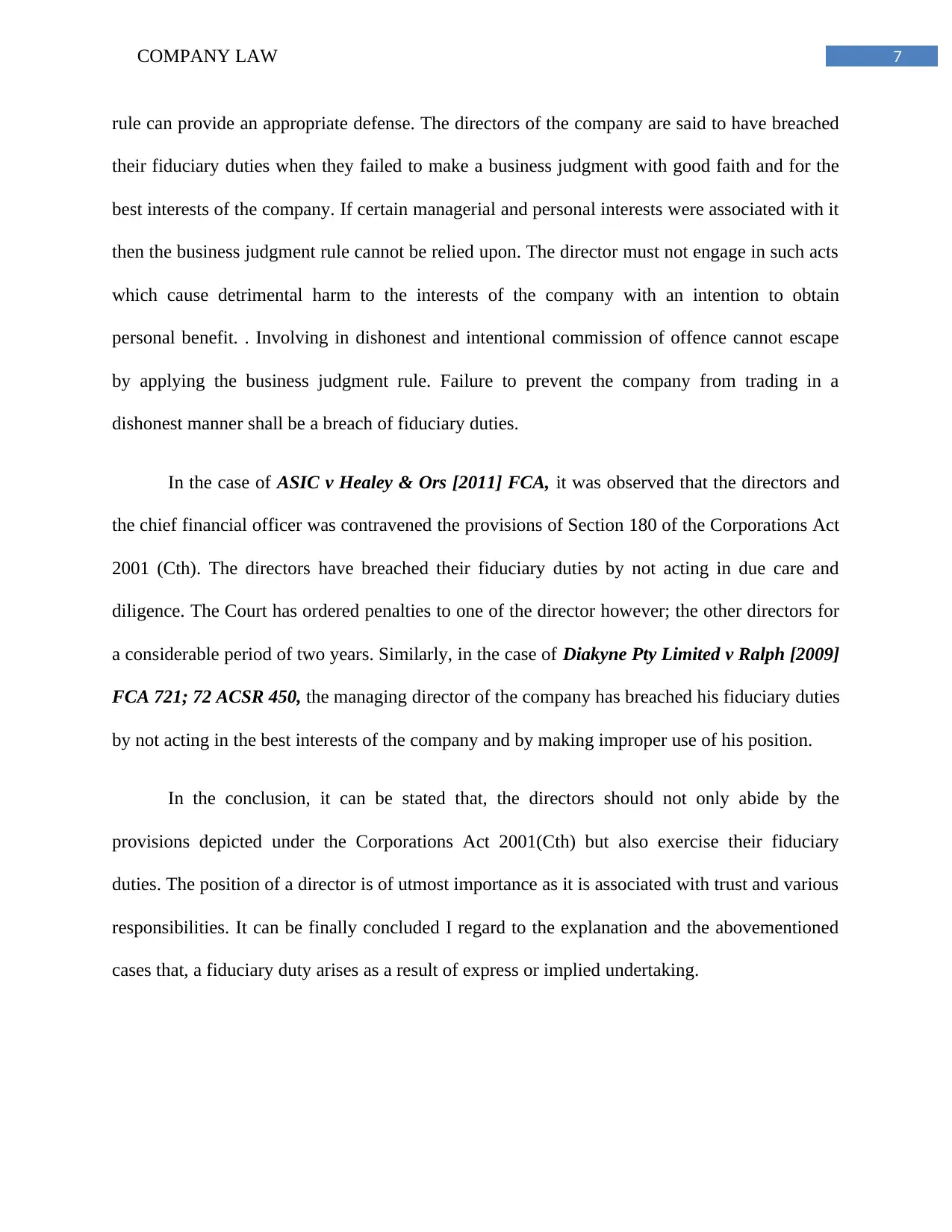
7COMPANY LAW
rule can provide an appropriate defense. The directors of the company are said to have breached
their fiduciary duties when they failed to make a business judgment with good faith and for the
best interests of the company. If certain managerial and personal interests were associated with it
then the business judgment rule cannot be relied upon. The director must not engage in such acts
which cause detrimental harm to the interests of the company with an intention to obtain
personal benefit. . Involving in dishonest and intentional commission of offence cannot escape
by applying the business judgment rule. Failure to prevent the company from trading in a
dishonest manner shall be a breach of fiduciary duties.
In the case of ASIC v Healey & Ors [2011] FCA, it was observed that the directors and
the chief financial officer was contravened the provisions of Section 180 of the Corporations Act
2001 (Cth). The directors have breached their fiduciary duties by not acting in due care and
diligence. The Court has ordered penalties to one of the director however; the other directors for
a considerable period of two years. Similarly, in the case of Diakyne Pty Limited v Ralph [2009]
FCA 721; 72 ACSR 450, the managing director of the company has breached his fiduciary duties
by not acting in the best interests of the company and by making improper use of his position.
In the conclusion, it can be stated that, the directors should not only abide by the
provisions depicted under the Corporations Act 2001(Cth) but also exercise their fiduciary
duties. The position of a director is of utmost importance as it is associated with trust and various
responsibilities. It can be finally concluded I regard to the explanation and the abovementioned
cases that, a fiduciary duty arises as a result of express or implied undertaking.
rule can provide an appropriate defense. The directors of the company are said to have breached
their fiduciary duties when they failed to make a business judgment with good faith and for the
best interests of the company. If certain managerial and personal interests were associated with it
then the business judgment rule cannot be relied upon. The director must not engage in such acts
which cause detrimental harm to the interests of the company with an intention to obtain
personal benefit. . Involving in dishonest and intentional commission of offence cannot escape
by applying the business judgment rule. Failure to prevent the company from trading in a
dishonest manner shall be a breach of fiduciary duties.
In the case of ASIC v Healey & Ors [2011] FCA, it was observed that the directors and
the chief financial officer was contravened the provisions of Section 180 of the Corporations Act
2001 (Cth). The directors have breached their fiduciary duties by not acting in due care and
diligence. The Court has ordered penalties to one of the director however; the other directors for
a considerable period of two years. Similarly, in the case of Diakyne Pty Limited v Ralph [2009]
FCA 721; 72 ACSR 450, the managing director of the company has breached his fiduciary duties
by not acting in the best interests of the company and by making improper use of his position.
In the conclusion, it can be stated that, the directors should not only abide by the
provisions depicted under the Corporations Act 2001(Cth) but also exercise their fiduciary
duties. The position of a director is of utmost importance as it is associated with trust and various
responsibilities. It can be finally concluded I regard to the explanation and the abovementioned
cases that, a fiduciary duty arises as a result of express or implied undertaking.
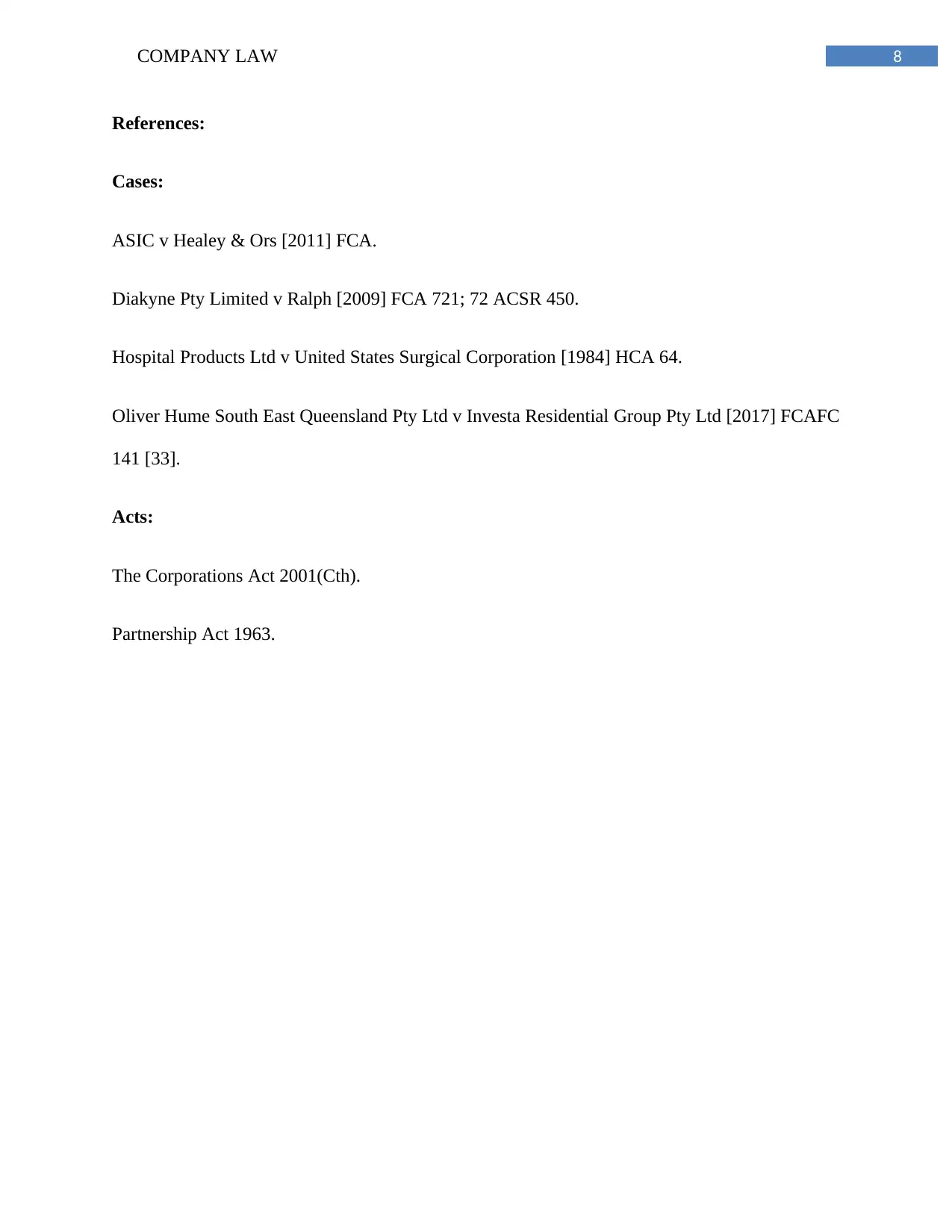
8COMPANY LAW
References:
Cases:
ASIC v Healey & Ors [2011] FCA.
Diakyne Pty Limited v Ralph [2009] FCA 721; 72 ACSR 450.
Hospital Products Ltd v United States Surgical Corporation [1984] HCA 64.
Oliver Hume South East Queensland Pty Ltd v Investa Residential Group Pty Ltd [2017] FCAFC
141 [33].
Acts:
The Corporations Act 2001(Cth).
Partnership Act 1963.
References:
Cases:
ASIC v Healey & Ors [2011] FCA.
Diakyne Pty Limited v Ralph [2009] FCA 721; 72 ACSR 450.
Hospital Products Ltd v United States Surgical Corporation [1984] HCA 64.
Oliver Hume South East Queensland Pty Ltd v Investa Residential Group Pty Ltd [2017] FCAFC
141 [33].
Acts:
The Corporations Act 2001(Cth).
Partnership Act 1963.
⊘ This is a preview!⊘
Do you want full access?
Subscribe today to unlock all pages.

Trusted by 1+ million students worldwide
1 out of 9
Related Documents
Your All-in-One AI-Powered Toolkit for Academic Success.
+13062052269
info@desklib.com
Available 24*7 on WhatsApp / Email
![[object Object]](/_next/static/media/star-bottom.7253800d.svg)
Unlock your academic potential
Copyright © 2020–2026 A2Z Services. All Rights Reserved. Developed and managed by ZUCOL.




